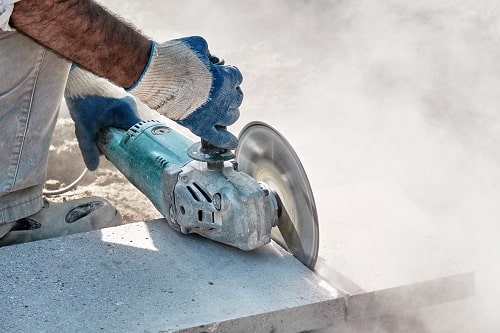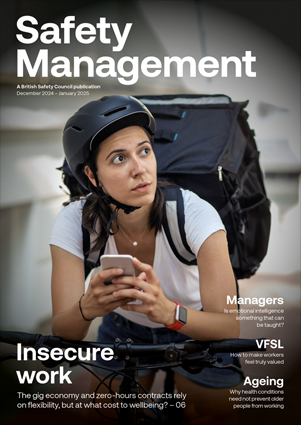Conversation is king when it comes to implementing effective workplace wellbeing strategies, a panel of experts told a recent conference organised and hosted by British Safety Council.
News
Employers urged to listen to staff when designing workplace wellbeing strategies
Actively listening to workers and engaging them in the process is vital, while skills such as empathy, emotional intelligence and conversational competence should be prized among those holding or seeking to hold leadership or managerial positions. These were some of the key points raised during the online Workplace Wellbeing – Engaging, Equipping and Empowering Employees in 2024 event on 24 April.
 British Safety Council's online Workplace Wellbeing - Engaging, Equipping and Empowering Employees in 2024 event was held on 24 April. Photograph: British Safety Council
British Safety Council's online Workplace Wellbeing - Engaging, Equipping and Empowering Employees in 2024 event was held on 24 April. Photograph: British Safety Council
Wellbeing in the workplace has moved beyond “fresh fruit Fridays” and “yoga and yoghurts” and is increasingly viewed by businesses as a win-win proposition, which benefits both staff and the bottom line. Using data collected through staff surveys and through regular conversations with employees, businesses can design and implement wellbeing strategies that work because they are tailored to the needs of their workers.
“We know that wellbeing is increasingly being seen through this responsible business lens, and I think organisations like Business in the Community have banged that drum, along with British Safety Council, for years and years,” Dr Shaun Davis, group director of safety, health and wellbeing at Belron International, told the conference. “We’re at the period now where wellbeing has moved from a litre of water and fresh fruit Friday through to having a much stronger business argument, and having a much more ethical, responsible business aspect to it, which I’m really pleased to see”.
Davis emphasised, though, that “health and wellbeing has to be done with people, not to them”, and that employers should make sure they “engage with people in a way that works with them”. Line managers “have to be conversationally competent” and “know how to have an empathetic conversation”, said Davis.
This point was echoed by Pen Le Kelly, communication and colleague engagement manager at CPI Mortars, who highlighted the importance of empathy and active listening skills and urged employers to “not overlook the softer skills when recruiting leaders”. After all, line managers “can really engage or disengage a whole team” and “play a vital role in wellbeing within their pockets of the organisation”, she added.
Kevin Hard, business development director at consultancy RyderMarsh OCAID, agreed that empathy is “key” and “leaders should have very high emotional intelligence” – a point backed up by Amanda Owen MBE, health, safety and wellbeing director at London Heathrow Airport, who argued that “EQ [emotional intelligence] is as important, if not more important, as IQ”.
Communication and engagement with the workforce should be “an ongoing thing” and companies should “seek feedback and understand what works and what doesn’t” when it comes to wellbeing offerings, according to Claire Burgess, head of health and wellbeing at Unipart Logistics. Unipart provides workers with DIY health kits as part of its wellbeing programme. Burgess said the kits have “stopped people having strokes and heart attacks” and have also “opened the door” for employees to talk about broader wellbeing issues.
After seeking suggestions from staff, Unipart also began offering smoking-cessation clinics and a prostate cancer screening programme, which the group’s health, safety and wellbeing manager, Neil Pinnell, said have had “incredible buy-in” from staff. Through its wellbeing programme, Unipart is providing “credible stuff that gives tangible benefits”, added Pinnell, and employees feel they are “being listened to”.
By understanding that “people are at the heart of it” and listening to what workers want, said Davis, companies can develop and implement wellbeing programmes that truly benefit both the business and the workers.
NEWS

Stonemason fined for exposing workers to silica dust as HSE updates advice for stone worktop installers
By Kerry Reals on 10 January 2025
A stonemasonry firm has received a fine of almost £20,000 for failing to protect workers from silica dust, as the Health and Safety Executive (HSE) issued new advice for stone worktop installers amid continued calls for engineered stone to be banned over its links to silicosis.

Quarter of Grenfell firefighters exposed to toxic smoke have developed health conditions, study finds
By Kerry Reals on 06 January 2025
More than one in four firefighters who responded to the Grenfell Tower fire in 2017 and were exposed to toxic smoke have reported long-term, life-changing health effects, new research has shown.

HSE at 50: health and safety regulator marks milestone anniversary
By Kerry Reals on 03 January 2025
Great Britain’s national health and safety regulator turned 50 years old on 1 January, half a century after its official launch on the first day of 1975.



